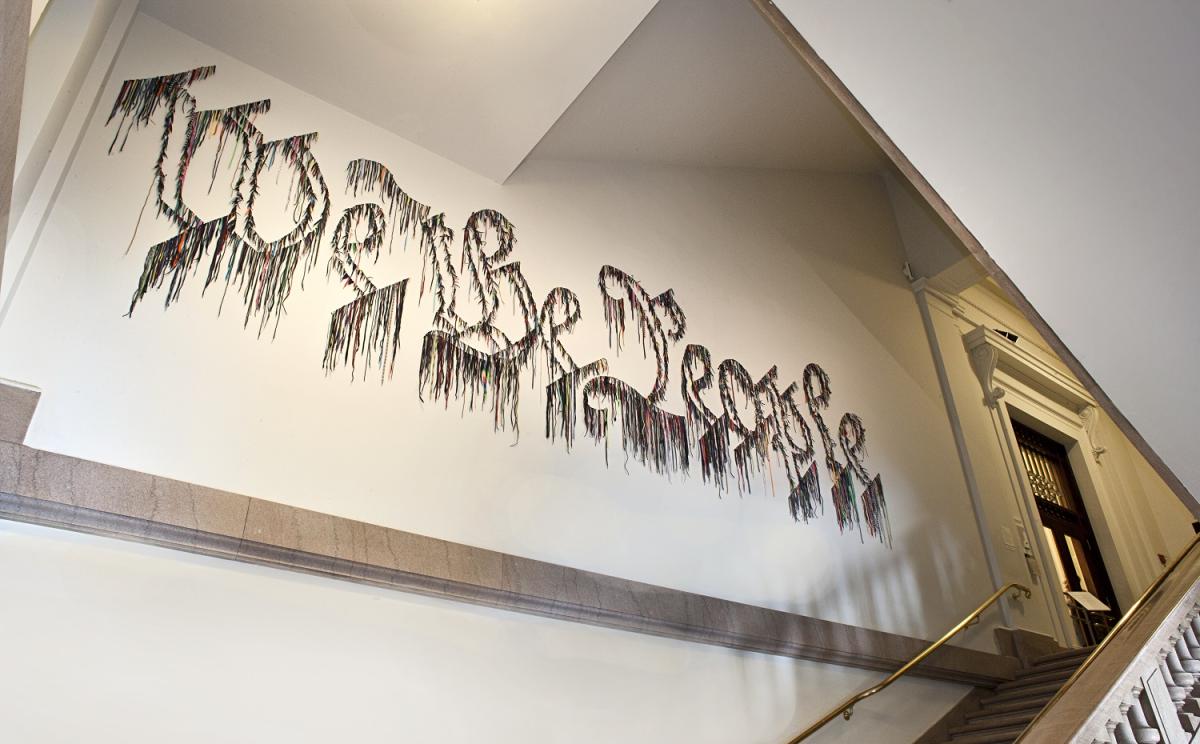
Presidential Libraries Partner with New-York Historical Society to Offer Citizenship Classes
By Angela Tudico | National Archives News
WASHINGTON, September 17, 2024 — Thousands of new Americans have taken their oaths of citizenship, swearing allegiance to the United States at Presidential Libraries nationwide for years. This Citizenship and Constitution Day, we celebrate the collaboration between the William J. Clinton, Gerald R. Ford, and Lyndon Baines Johnson Presidential Libraries and the New-York Historical Society on the Citizenship Project, a program that offers free civics classes to participants studying for their citizenship exams.
“Presidential Libraries play a crucial role in inspiring civic engagement and encouraging visitors to reflect on the importance of leadership, democracy, and civic responsibility,” said Kara Blond, Executive for Presidential Libraries. “I'm proud these libraries use their knowledge and resources to create a tangible and lasting civic foundation for citizenship candidates both in their communities and around the country.”
The course helps green card holders prepare for all 100 questions on the civics portion of the United States Citizenship and Immigration Services (USCIS) exam by using paintings, objects, and records from the New-York Historical Society’s collection, as well as material from the Presidential Libraries. The libraries’ educators adapt the curriculum to make it meaningful for students in each community.
Kathleen Pate, education specialist at the Clinton Library in Little Rock, is incorporating more records from the National Archives as well as objects from local Arkansas-based museums.
“One example is a work of art by Nari Ward, We the People, a huge installation made out of shoelaces that spells out those words. While the New-York Historical Society has the shoelaces on a white background, and that’s what they show in the curriculum, Crystal Bridges Museum of American Art in northwest Arkansas has the piece on black,” said Pate. “If there’s a way to make the curriculum more meaningful or for students to go see the original where it’s located, I want to make those changes.”
Similarly, LBJ Library Education Specialist Sheila Mehta, based in Austin, TX, teaches virtual classes to students located across the country. When discussing Indigenous peoples, she will discuss local tribes based on where her students are located.
These adaptations seem to be working. Pate and Mehta both shared that students report back when they pass the test, as well as how appreciative they are to have a safe space to learn and ask questions in preparation for the exam.
“As far as I know, we’re at a 100% success rate. They leave the course with 100% capability,” said Mehta. “It is lovely to know we’re able to help them in achieving their goal.”
Since piloting the program in 2022, the Clinton and LBJ Libraries have each run the course three additional times. The Ford Library offered the course for the first time this past spring.
"The New-York Historical Society is excited to partner with Presidential Libraries on the Citizenship Project,” said Samantha Rijkers, former senior manager of the Citizenship Project, New-York Historical Society. “The partnerships expand our reach nationally, and the Presidential Libraries are uniquely positioned to teach civics to immigrants in their communities with our curriculum."
The participating Presidential Libraries similarly view their participation in this program and became involved when looking for ways to expand their education and public programs. The Presidential Libraries are also finalizing a partnership agreement with the New-York Historical Society to allow any Library to participate in the program.
The Citizenship Project courses that the Presidential Libraries provide complement other education and civics-focused programs offered by the National Archives as well as naturalization ceremonies co-hosted with United States Citizenship and Immigration Services in the Rotunda of the National Archives at Washington, DC, twice a year. Ceremonies take place across the country and throughout the year at the Presidential Libraries as well.
“These are folks who have been patient, have worked hard, who are doing great things in their communities, and just want to be American citizens,” said Richard Weld, education specialist at the Ford Library. “I think it’s great that we can help them.”
View Education Programs for more information on classes and other educational resources offered by the Presidential Libraries.
